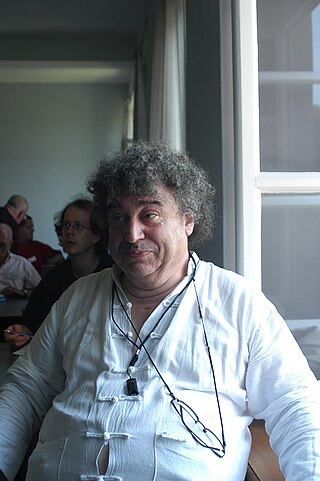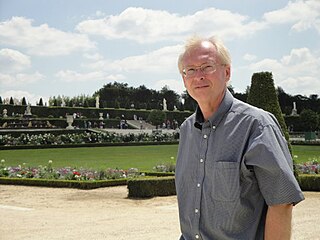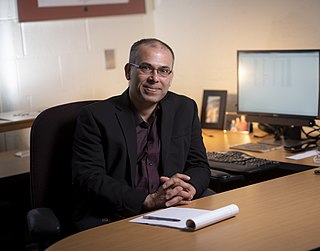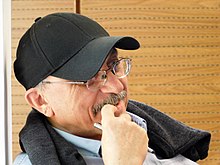
Donald Ervin Knuth is an American computer scientist and mathematician. He is a professor emeritus at Stanford University. He is the 1974 recipient of the ACM Turing Award, informally considered the Nobel Prize of computer science. Knuth has been called the "father of the analysis of algorithms".

Robert Sedgewick is an American computer scientist. He is the founding chair and the William O. Baker Professor in Computer Science at Princeton University and was a member of the board of directors of Adobe Systems (1990–2016). He previously served on the faculty at Brown University and has held visiting research positions at Xerox PARC, Institute for Defense Analyses, and INRIA. His research expertise is in algorithm science, data structures, and analytic combinatorics. He is also active in developing college curriculums in computer science.

Andrew Chi-Chih Yao is a Chinese computer scientist and computational theorist. He is currently a professor and the dean of Institute for Interdisciplinary Information Sciences (IIIS) at Tsinghua University. Yao used the minimax theorem to prove what is now known as Yao's Principle.

Dabbala Rajagopal "Raj" Reddy is an Indian-American computer scientist and a winner of the Turing Award. He is one of the early pioneers of artificial intelligence and has served on the faculty of Stanford and Carnegie Mellon for over 50 years. He was the founding director of the Robotics Institute at Carnegie Mellon University. He was instrumental in helping to create Rajiv Gandhi University of Knowledge Technologies in India, to cater to the educational needs of the low-income, gifted, rural youth. He was the founding chairman of International Institute of Information Technology, Hyderabad. He is the first person of Asian origin to receive the Turing Award, in 1994, known as the Nobel Prize of Computer Science, for his work in the field of artificial intelligence.

Philippe Flajolet was a French computer scientist.

The Courant Institute of Mathematical Sciences is the mathematics research school of New York University (NYU). Founded in 1935, it is named after Richard Courant, one of the founders of the Courant Institute and also a mathematics professor at New York University from 1936 to 1972, and serves as a center for research and advanced training in computer science and mathematics. It is located on Gould Plaza next to the Stern School of Business and the economics department of the College of Arts and Science.

David A. Bader is a Distinguished Professor and Director of the Institute for Data Science at the New Jersey Institute of Technology. Previously, he served as the Chair of the Georgia Institute of Technology School of Computational Science & Engineering, where he was also a founding professor, and the executive director of High-Performance Computing at the Georgia Tech College of Computing. In 2007, he was named the first director of the Sony Toshiba IBM Center of Competence for the Cell Processor at Georgia Tech.

Ei-ichi Negishi was a Japanese chemist who was best known for his discovery of the Negishi coupling. He spent most of his career at Purdue University in the United States, where he was the Herbert C. Brown Distinguished Professor and the director of the Negishi-Brown Institute. He was awarded the 2010 Nobel Prize in Chemistry "for palladium catalyzed cross couplings in organic synthesis" jointly with Richard F. Heck and Akira Suzuki.

Sanjeev Arora is an Indian American theoretical computer scientist who works in AI and Machine learning.

Daniel M. Fleetwood is an American scientist, inventor, engineer and innovator. He is credited as being one of the first to identify the origins of flicker noise in semiconductor devices and its usefulness in understanding the effects of ionizing radiation on microelectronic devices and materials.

Shrikanth Narayanan is an Indian-American Professor at the University of Southern California. He is an interdisciplinary engineer–scientist with a focus on human-centered signal processing and machine intelligence with speech and spoken language processing at its core. A prolific award-winning researcher, educator, and inventor, with hundreds of publications and a number of acclaimed patents to his credit, he has pioneered several research areas including in computational speech science, speech and human language technologies, audio, music and multimedia engineering, human sensing and imaging technologies, emotions research and affective computing, behavioral signal processing, and computational media intelligence. His technical contributions cover a range of applications including in defense, security, health, education, media, and the arts. His contributions continue to impact numerous domains including in human health, national defense/intelligence, and the media arts including in using technologies that facilitate awareness and support of diversity and inclusion. His award-winning patents have contributed to the proliferation of speech technologies on the cloud and on mobile devices and in enabling novel emotion-aware artificial intelligence technologies.
Prashant Shenoy is an Indian-American Computer Scientist. He is a Distinguished Professor of Computer Science in the College of Information and Computer Sciences at the University of Massachusetts Amherst. He is known for his contributions to distributed computing, computer networks, cloud computing, and computational sustainability.
Kristen Lorraine Grauman is a Professor of Computer Science at the University of Texas at Austin on leave as a research scientist at Facebook AI Research (FAIR). She works on computer vision and machine learning.
The Philippe Flajolet Lecture Prize is awarded to for contributions to analytic combinatorics and analysis of algorithms, in the fields of theoretical computer science. This prize is named in memory of Philippe Flajolet.
Daniel Abadi is the Darnell-Kanal Professor of Computer Science at University of Maryland, College Park. His primary area of research is database systems, with contributions to stream databases, distributed databases, graph databases, and column-store databases. He helped create C-Store, a column-oriented database, and HadoopDB, a hybrid of relational databases and Hadoop. Both database systems were commercialized by companies.
Niklas Elmqvist is a Swedish-American computer scientist. He is currently a professor in the Department of Computer Science at Aarhus University, and a Villium Investigator. He is the Director of the Center for Anytime Anywhere Analytics at Aarhus University, a research center on augmented reality and extended reality (AR/XR) for data visualization.

Saurabh Bagchi is an Indian-born American academic researcher and educator in the area of computer science and engineering. He is a professor of Electrical and Computer Engineering and Computer Science at Purdue University. His contributions have been in the area of reliability and security of distributed computing systems and Internet-of-Things (IoT).
AofA, the International Meeting on Probabilistic, Combinatorial and Asymptotic Methods for the Analysis of Algorithms is an academic meeting that has been held regularly since 1993 in the field of computer science, focusing on mathematical methods from analytic combinatorics and probability for the study of properties of algorithms and large combinatorial structures. In early years, different formal names were used, but the meeting and associated community of researchers has always been known as AofA.
Xi Chen is a computer scientist. He is a professor of computer science at Columbia University. Chen won the 2021 Gödel Prize and Fulkerson Prize for his co-authored paper "Complexity of Counting CSP with Complex Weights" with Jin-Yi Cai.
Jarosław Duda, also known as Jarek Duda, is a Polish computer scientist and an assistant professor at the Institute of Computer Science and Computational Mathematics of the Jagiellonian University in Kraków. He is known as the inventor of asymmetric numeral systems (ANS), a family of entropy encoding methods widely used in data compression.












